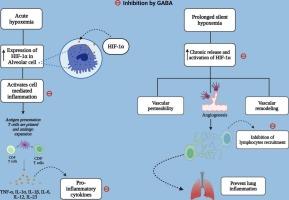COVID-19中GABA和GABA能功能障碍:用靶向免疫和几种炎症途径拼凑谜团
IF 3.7
3区 医学
Q2 BIOCHEMISTRY & MOLECULAR BIOLOGY
引用次数: 0
摘要
2019冠状病毒病(COVID-19)是由一种名为严重急性呼吸综合征冠状病毒2 (SARS-CoV-2)的新型呼吸道病毒引起的全球大流行疾病。导致重症COVID-19患者出现炎症性和免疫性疾病的主要因素主要是T细胞和巨噬细胞过度活化,导致白细胞介素和趋化因子等促炎细胞因子大量释放。研究表明,抑制性神经递质γ -氨基丁酸(GABA)在减轻某些炎症性疾病方面具有抗炎特性。研究表明,COVID-19感染引起的炎症和氧化应激可能导致COVID-19患者gaba能神经传递中断。GABA和GABA激动剂可能通过抑制促炎细胞因子的释放和炎症途径,如核因子κB (NF-κB)和淋巴结样受体pyrin 3 (NLRP3)炎症小体,成为治疗COVID-19的潜在成功治疗方法。因此,本综述的目的是讨论GABA和GABA激动剂在缓解COVID-19引起的炎症性疾病中的潜在作用。本文章由计算机程序翻译,如有差异,请以英文原文为准。

GABA and GABAergic dysfunction in COVID-19: Piecing the puzzle with targeting immunity and several inflammatory pathways
Coronavirus disease 2019 (COVID-19) is a global pandemic disease caused by a new type of respiratory virus called severe acute respiratory syndrome coronavirus 2 (SARS-CoV-2). The primary factors contributing to inflammatory and immunological diseases in patients with severe COVID-19 are primarily attributed to the excessive activation of T cells and macrophages, resulting in the massive release of pro-inflammatory cytokines, including interleukins and chemokines. Studies have indicated that the inhibitory neurotransmitter gamma-aminobutyric acid (GABA) possesses anti-inflammatory properties in mitigating certain inflammatory disorders. It has been shown that inflammation and oxidative stress caused by COVID-19 infection may lead to a disruption of GABAergic neurotransmission in COVID-19 patients. GABA and GABA agonists could be potential successful treatments for the management of COVID-19 by inhibiting the release of pro-inflammatory cytokines and inflammatory pathways such as nuclear factor kappa B (NF-κB) and the nod-like receptor pyrin 3 (NLRP3) inflammasome. Therefore, the purpose of this review was to discuss the potential role of GABA and GABA agonists in the alleviation of inflammatory disorders caused by COVID-19.
求助全文
通过发布文献求助,成功后即可免费获取论文全文。
去求助
来源期刊

Cytokine
医学-免疫学
CiteScore
7.60
自引率
2.60%
发文量
262
审稿时长
48 days
期刊介绍:
The journal Cytokine has an open access mirror journal Cytokine: X, sharing the same aims and scope, editorial team, submission system and rigorous peer review.
* Devoted exclusively to the study of the molecular biology, genetics, biochemistry, immunology, genome-wide association studies, pathobiology, diagnostic and clinical applications of all known interleukins, hematopoietic factors, growth factors, cytotoxins, interferons, new cytokines, and chemokines, Cytokine provides comprehensive coverage of cytokines and their mechanisms of actions, 12 times a year by publishing original high quality refereed scientific papers from prominent investigators in both the academic and industrial sectors.
We will publish 3 major types of manuscripts:
1) Original manuscripts describing research results.
2) Basic and clinical reviews describing cytokine actions and regulation.
3) Short commentaries/perspectives on recently published aspects of cytokines, pathogenesis and clinical results.
 求助内容:
求助内容: 应助结果提醒方式:
应助结果提醒方式:


